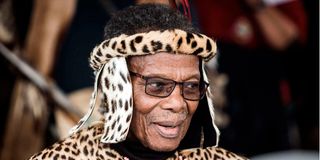South Africa holds state funeral for divisive Zulu leader Buthelezi

Senior Prince of the Zulu Nation and former leader of the Inkatha Freedom Party (IFP) Prince Mangosuthu Buthelezi joins thousands gathered to commemorate King Shaka's Day Celebration near the grave of the great Zulu King Shaka at Kwadukuza, some 98 kilometres north of Durban, on September 24, 2019.
Thousands of people, some holding spears and dressed in traditional warrior clothes, on Saturday attended the funeral of South Africa's divisive Zulu leader Mangosuthu Buthelezi, who was implicated in a wave of deadly violence that marked the country's emergence from apartheid.
Mourners crowded a small stadium in Ulundi, the ancient capital of the Zulu kingdom in eastern South Africa, to pay tribute to the founder of the Inkatha Freedom Party (IFP), who died on September 9 aged 95.
Family members dressed in black, followed by men holding shields and spears, led a coffin covered by an animal skin and an IFP flag across a red carpet inside the stadium before it was placed under a black canopy on the pitch.
Earlier, members of the IFP Women's Brigade chanted "He has led us this far" in Zulu as guests including President Cyril Ramaphosa and his predecessor Jacob Zuma arrived at the venue, sitting under white marquees opposite an altar.
"He treated all of us Zulus as one person. That is why I am here," said Bonga Makhoba, 31, who said he drove 150 kilometres and slept in his car to attend the ceremony.
"I just respect him and I want him to... rest in peace."
Ramaphosa, who ordered flags to be flown at half staff across the country, was to deliver a eulogy during the service celebrated by the head of South Africa's Anglican Church.
"Buthelezi has been an outstanding leader in the political and cultural life of our nation, including the ebbs and flows of our liberation struggle," Ramaphosa had said when announcing Buthelezi's death last Saturday.
Buthelezi was once a rival of Ramaphosa and his former boss Nelson Mandela, as the pair led negotiations to end white rule in South Africa, and for years was locked in a bitter rivalry with the ruling African National Congress (ANC).
The party was his political home until he broke away to form the Inkatha movement in 1975.
Born of royal blood, he was to some the embodiment of a proud and feisty Zulu spirit, while to others he often acted as a warlord.
'Despised' or 'hero'
As premier of the "independent" homeland of KwaZulu, a political creation of the apartheid government, Buthelezi was often regarded as an ally of the racist regime.
He was dogged by allegations of collaborating with the white government to fuel violence and derail the ANC's liberation struggle -- a claim he furiously denied.
Violence between Inkatha supporters and rival liberation groups claimed about 12,000 lives, as unrest between the ANC and IFP escalated in the run-up to the democratic elections in 1994.
Following an 11th-hour turnabout, he was later appointed home affairs minister in the national unity government led by Mandela.
Admired as a charismatic speaker, Buthelezi went on to become one of the country's longest-serving lawmakers, widely recognisable with his slender silhouette and distinctive rectangular glasses.
But while considered a cultural protector for the more than 11 million Zulus, his legacy remains contested.
Buthelezi's epitaph should read "Chief apartheid collaborator and mass murderer", wrote Mondli Makhanya, editor of the City Press newspaper.
The Sowetan, a daily born out of the liberation struggle, wrote that "For his supporters, who worshipped the ground he walked on, he is held in high regard as a hero".
However he would "remain a despised figure in the eyes of those who suffered brutality and violence in the hands of his party henchmen".
The Prince Mangosuthu Buthelezi Foundation rejected such criticism as "unspeakably evil" and "old lies".
"Everybody has their past but Buthelezi to me, he was the best," Fisokhule Buthelezi, 45, a distant relative sporting a black IFP beret, said as she sat on the stands waiting for the ceremony to begin.





